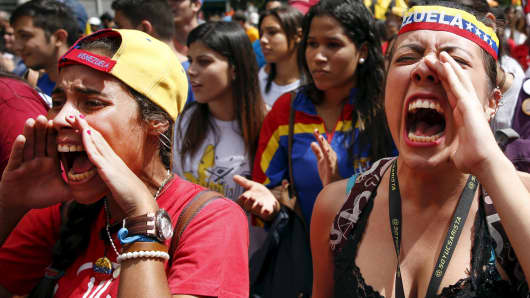Venezuela flirts with default, could be worse than Argentina
posted on
Feb 07, 2016 02:34PM

Crystallex International Corporation is a Canadian-based gold company with a successful record of developing and operating gold mines in Venezuela and elsewhere in South America


Venezuela, a country that has endured nearly three continuous years of economic and social crises, is all but certain to touch off a new round of instability — one that is not altogether unfamiliar territory for emerging markets.
With inflation logging near triple-digit gains and crude oil — the lifeblood of the Bolivarian Republic's economy — deeply entrenched in a bear market, market observers are bracing themselves for the prospect of a calamitous debt default sometime this year. Last month, Venezuelan president Nicolas Maduro used his national address on Jan. 15 to declare an "economic emergency," augmented by a political stalemate with the country's congress. The International Monetary Fund estimated Venezuela's economy contracted by at least 7 percentin 2015.
Read MoreVenezuela cuts gas exports to Colombia
More than a decade ago, Argentina's messy collapse triggered the largest sovereign debt default in history. Venezuela's external debt, estimated to be $185 billion, according to central bank data, is considerably more than Argentina's 2001 default on more than $100 billion of its obligations.
Though Venezuelan debt is not widely held by private institutions, it could yet ricochet across the region. Writing in the Financial Times last week, Harvard Economist Ricardo Hausmann said that Venezuela's political instability, a fact of life since the death of former president Hugo Chavez, could make its potential default eclipse Argentina's 2001 debacle.
"Venezuela is in a death spiral," Steve Hanke, professor of applied economics at Johns Hopkins University and director of the Troubled Currencies Project told CNBC. For the second consecutive year, the Andean nation topped Hanke's list of "most miserable" countries.
"Without a change of government or ideology," both debt prices and Venezuela's currency — the bolivar — "will continue to sink."
Much of Venezuela's debt is denominated in bolivars, which in theory means the government can print whatever it needs to pay those obligations. Its foreign currency denominated debt, however, is a whole other story — and is what could make a default so messy.
On rare occasions, a financial crisis can trigger a dramatic reversal of fortune. Both Brazil and Mexico experienced wrenching currency crises in the 1990s that resulted in painful adjustments, but both rebounded relatively quickly.
In the aftermath of Argentina's 2001 credit event, the country endured a messy devaluation, was shut out of the financial markets and endured a stretch of political uncertainty. Yet by early 2003, Argentina's economy roared back, galloping ahead at a torrid 9 percent pace for 5 years.
Few, however, expect Venezuela to see the same sort of beneficial outcome. The country's heavy reliance on oil — which has plunged from above $100 last year and now hovers near $30 per barrel — as well as the government's profligate social spending has dug it into a deep hole from which virtually no one expects it to escape.
http://www.cnbc.com/2016/02/04/venezuela-flirts-with-default-could-be-worse-than-argentina.html